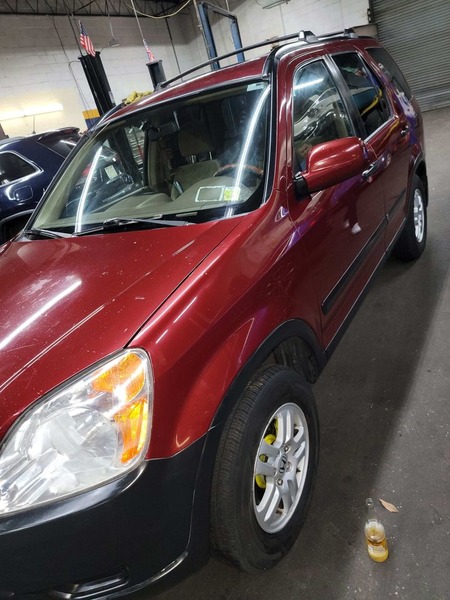The 2003 Honda CR-V is a mid-size SUV popular among car lovers for years. With its spacious interior, comfortable ride, and reliable performance, it is no wonder why this vehicle has stood the test of time. The 2003 model came with a standard five-speed manual transmission or an optional four-speed automatic transmission. Depending on your preference, it also offers front-wheel drive or all-wheel drive capability. Do you own a 2003 Honda CR-V, or are you planning to buy one? It’s always good to be informed about any potential problems that could arise with your vehicle.
We will discuss the common 2003 Honda CRV Problems owners face and their solutions. From electrical issues to engine troubles, we’ve got it all covered. We’ll also provide tips for diagnosing and troubleshooting your CR-V should any problems arise.
Common 2003 Honda CRV Problems & Solutions
The 2003 Honda CR-V is a reliable and practical SUV that has become a popular option for those in the market for a used car. With its spacious interior, comfortable seating, and good fuel economy, it’s no wonder why the CR-V has been a favorite among families and commuters alike. Regarding owning a 2003 Honda CR-V, various issues could arise. One common problem is with the brakes and suspension.
It’s important to regularly check and replace worn-out bushings, shocks, and struts to prevent any suspension issues from occurring. One common issue with the 2003 Honda CRV is wiring harness problems which can lead to fuel gauge inaccuracies, warning lights, and potential engine issues, often requiring attention to the catalytic converters. Additionally, staying on top of brake maintenance is crucial for ensuring your safety on the road. Here are some 2003 Honda CRV Problems and solutions below:
Electrical Issues
Maintaining an active lifestyle is important, but so is ensuring that your vehicle’s electrical system is in good condition. One of the most common issues reported with the 2003 Honda CR-V is a faulty alternator, which can lead to various electrical problems, including dimming lights and difficulty starting the vehicle.
Other electrical problems may manifest as malfunctioning power windows or a defective ignition switch, leading to stalling or other issues. It’s crucial to have any electrical issues diagnosed and repaired by a qualified mechanic to ensure safety on the road. Regular maintenance and inspections can help prevent these issues from arising in the first place.
Brakes And Suspension
Maintaining a smooth and safe ride is essential, starting with the brakes and suspension. Unfortunately, the 2003 Honda CR-V had some reported issues with these critical components. Some owners reported brake pedal vibrations or noises while braking, which could indicate worn or warped rotors. Suspension issues may include worn-out struts, shocks, or bushings that lead to a bumpy ride or uneven tire wear.
Regular maintenance and inspections can help prevent these problems from occurring or catch them early on. If you experience any issues with your brakes or suspension, it’s important to have them checked by a professional mechanic for safety reasons.
Engine Troubles
Regarding the 2003 Honda CR-V, engine troubles are a common issue many owners face. Engine misfires and stalling can be caused by various factors, including faulty spark plugs or ignition coils. Regular maintenance, such as oil changes and air filter replacements, can go a long way in preventing these issues from occurring. The worst issue with the 2003 Honda CRV is brake failure, dashboard lights, and transmission fluid problems, causing inconvenience for customers and making it one of the worst vehicles. However, if you experience problems with your CR-V’s engine, it’s important to take it to a trusted mechanic for diagnosis and repair. Ignoring these issues can lead to more severe problems and compromise your safety.
Paint/Trim Problems
Maintaining the exterior of your 2003 Honda CR-V is crucial to prevent paint and trim problems. Unfortunately, many CR-V owners have reported issues with peeling paint and rusting trim, which can be costly. These problems are typically caused by improper adhesion between the paint and metal surface, leading to flaking and rusting over time. A major issue with the 2003 Honda CRV is excessive oil consumption, which can be resolved with the Clarity Plug-In.
Additionally, the car may have excessive noise and paint/trim problems, but these can be overlooked with the convenience of cup holders. To avoid these issues, it’s important to keep your vehicle clean and dry, address any scratches or chips in the paint as soon as possible, and apply protective coatings for added durability. Regular maintenance can also help prevent future issues with paint and trim, ultimately keeping your CR-V looking new for longer.
Air Conditioning Is Blowing Warm Air
Driving with a malfunctioning air conditioning system can be a frustrating and uncomfortable experience, especially during the hot summer months. If you own a 2003 Honda CR-V and notice the AC blowing warm air. This is a common issue experienced by many owners of this vehicle model. The culprit could be anything from a refrigerant leak to a faulty compressor, which are both complex issues that require the attention of a professional mechanic for proper diagnosis and repair.
Regular maintenance can help prevent future AC problems. Ensure that the air filters are cleaned or replaced periodically, which will improve airflow and reduce strain on the system. Promptly addressing any AC issues can prevent further damage to your car while ensuring your safety and comfort.
Door Lock May Be Sticky And Not Work Due To Worn Door Lock Tumblers
As your 2003 Honda CR-V ages, the door locks become sticky and tough. This is due to wear on the door lock tumblers, which can make exiting or entering your vehicle a hassle. Aside from the inconvenience, this can also be a safety concern if you need to exit your vehicle quickly in an emergency. To address this problem, it’s recommended that you replace the worn lock tumblers as soon as possible. Regular maintenance and lubrication of the door locks can also help prevent this issue from occurring in the future.
Groaning Noise On Turns Due To Differential Fluid Breakdown
If you’re experiencing a groaning noise when making turns in your 2003 Honda CR-V. This is a common issue among owners of this vehicle, and the breakdown of the differential fluid often causes it. This fluid is responsible for lubricating and cooling the gears in the differential, which transfers power from the engine to the wheels. When it breaks down or becomes contaminated, it can cause damage to the gears and lead to costly repairs if left unchecked.
To prevent this issue from occurring, it’s important to have the differential fluid replaced with high-quality synthetic fluid regularly. You should also have your vehicle inspected by a professional mechanic if you hear unusual driving noises. Catching issues early can help prevent them from becoming bigger problems. By addressing this problem promptly, you can ensure safe and smooth driving in your 2003 Honda CR-V.
Harsh Shift From First To Second Gear In Automatic Transmission
2003 Honda CR-V owners commonly face a harsh shift from first to second gear in the automatic transmission. This problem can lead to further damage to the transmission if left unchecked. A software update, replacing the shift solenoid, or even a transmission rebuild may be necessary to address this issue. Regular maintenance and inspections are crucial in catching this problem before it escalates into a more significant concern. It’s essential to take any unusual shifting behavior seriously and have it checked by a qualified mechanic to ensure safe driving and avoid costly repairs.
Tailgate Light on Dash May Flicker
Flickering the tailgate light on the dashboard is a common issue with 2003 Honda CR-Vs, and it can cause problems such as a dead battery or other electrical issues. The problem can arise from a faulty tailgate latch or switch, and it’s important to address it promptly to ensure safe driving and avoid further damage. Regular maintenance and inspections of the tailgate latch and switch can prevent this issue from happening in the first place. If you notice any unusual behavior with your CR-V’s tailgate light, seek help from a qualified mechanic for diagnosis and repair.
Noise From Water Pump Bearing
The water pump is an essential component of the 2003 Honda CR-V’s engine, and any noise emanating from it can be alarming. A common issue with this vehicle is noise from the water pump bearing. If left untreated, this issue can lead to overheating and engine damage. The fix for this problem is relatively simple – replacing the water pump and bearing – but a qualified mechanic should do it to ensure proper installation. Regular maintenance and inspection of your vehicle can help prevent this issue from occurring, so don’t hesitate to take your CR-V in for service if you hear any strange noises coming from under the hood.
Safety Considerations When Driving A 2003 Honda CR-V
When driving a 2003 Honda CR-V, safety considerations are of utmost importance. From regular maintenance to ensuring potential safety hazards have been addressed, taking precautions can make all the difference in reducing the risk of accidents on the road. Following these safety considerations, drivers can enjoy a safe and reliable experience operating a 2003 Honda CR-V. To ensure a safe driving experience, several key considerations should be taken into account:
- Regular Maintenance
- Tires
- Braking System
- Vehicle Lighting
- Seat Belts and Airbags
What Is The Best Year for A Used Honda CR-V?
The Honda CR-V has been a reliable SUV model for many years, but the 2015 and newer models have received particularly high ratings for safety and reliability. The 2017 model also introduced a turbocharged engine option for improved performance.
Ultimately, the best year for a used Honda CR-V will depend on your budget and specific needs. Consider factors such as mileage, condition, and any additional features you may want when making your decision.
Conclusion
The 2003 Honda CRV Problems has a lot to offer drivers searching for a reliable and practical vehicle. One of the biggest pros of this car is its fuel efficiency, with an EPA-estimated 22 City/26 highway mpg rating. It also has a spacious and comfortable interior that can accommodate up to five passengers, making it a great choice for families or those who frequently travel with friends. The CR-V’s all-wheel-drive system provides excellent traction in inclement weather, while its high ground clearance allows for easy off-road driving. Keeping your CR-V in top condition is essential to ensure safety while driving. A certified mechanic should conduct regular maintenance checks and repairs to ensure your vehicle is safe.
FAQ
Is the 2003 Honda CR-V a good vehicle?
Yes, people generally consider the 2003 Honda CR-V a reliable vehicle. It has good fuel pressure and offers a comfortable ride, ample cargo space, and decent fuel efficiency. However, it’s always recommended to have a thorough inspection and test drive before purchasing any used vehicle.
What is the biggest problem with the Honda CR-V?
The biggest problem with the Honda CR-V is the fuel tank pressure sensor. Some owners have reported issues with the sensor failing, which can cause the check engine light to illuminate and affect the vehicle’s performance.
Is the Honda CR-V 2003 fuel efficient?
The fuel efficiency of a Honda CR-V 2003 will depend on various factors such as driving conditions and maintenance. On average, the Honda CR-V 2003 has a fuel economy of around 22-26 miles per gallon in combined city and highway driving.
Which year used Honda CR-V is best?
The best year for a used Honda CR-V depends on your specific needs and preferences. However, some popular and highly-rated model years include 2015, 2016, and 2017. It’s always recommended to thoroughly research and inspect any used vehicle before making a purchase decision.
Are older Honda CR-V reliable?
Yes, people generally consider older Honda CR-Vs to be reliable vehicles. They have a reputation for longevity and dependability, making them a popular choice among used car buyers.

